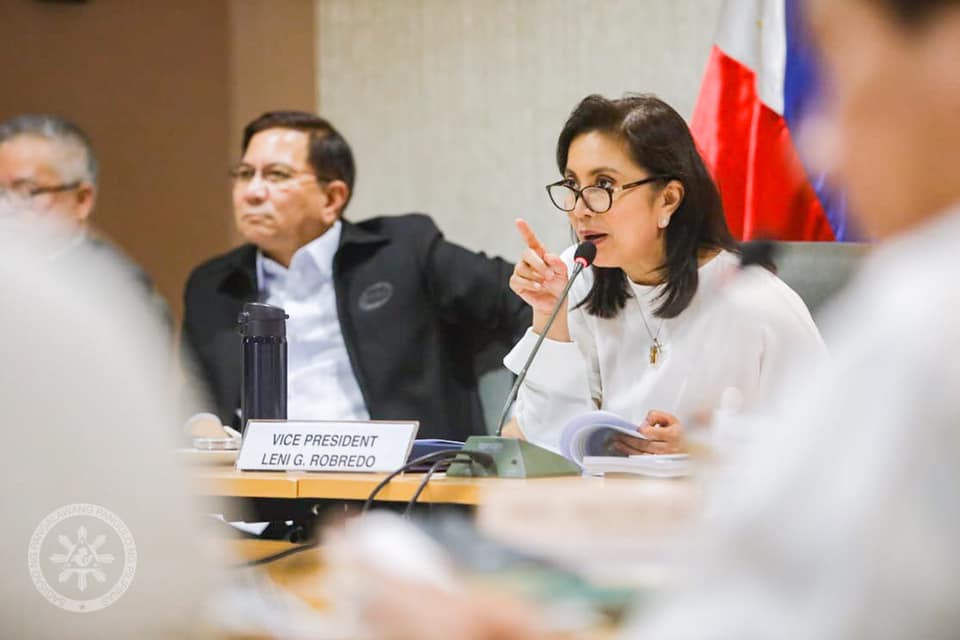Getting behind the news: Robredo as the anti-drug czar

“YOU WANT it? You’re more bright? Then try it.”
This was President Rodrigo Duterte daring Vice President Leni Robredo to be the government’s anti-drug “czar” last October 28.
In the presence of Malacañang reporters, Duterte responded angrily to the vice president’s criticism of his controversial “war on drugs” first reported by Reuters in October 23. Succeeding news accounts noted that Robredo initially kept mum, apparently because she wasn’t sure whether Duterte was serious. But subsequent reports quoted Presidential Spokesperson Salvador Panelo saying that Duterte was indeed serious, denying it was a trap, as members of the opposition had reportedly warned Robredo.
Media captured the fast and furious pace of statements from the Palace which justified the doubts about the president’s sincerity in saying he would cede authority to Robredo where he had failed. During a press briefing on October 29, Panelo even chided Robredo to just shut up if she can’t take on Duterte’s dare to be the anti-drug czar.
But a memorandum signed by Duterte on October 31, released only on November 5, did name Robredo as “co-chairperson” of the Inter-Agency Committee on Anti-Illegal Drugs (ICAD). The position is shared with Aaron Aquino, chief of the Philippine Drug Enforcement Agency (PDEA). The following day, Robredo announced that she was taking the position, a decision that surprised both her allies and naysayers. This acceptance was a game changer as it turned the tables on the president, silencing the taunts at least for a time.
Keeping track of developments and with the exchange taking a life of its own, most reports did not reflect the nuances of the fluid situation. Was the president sincere when he offered to surrender his law enforcement powers to Robredo? Or was the set up designed only to silence her? Apart from directly quoting, coverage lacked both analysis and interpretation.
CMFR reviewed coverage of the leading Manila broadsheets (Manila Bulletin, the Philippine Daily Inquirer and The Philippine Star), the primetime newscasts (ABS-CBN 2’s TV Patrol, CNN Philippines’ News Night, GMA-7’s 24 Oras and TV5’s Aksyon), as well as selected news websites from October 28 to November 8, 2019.
Who said what
The “Undas” break suspended coverage as Robredo had kept her cool, letting the Palace do the talking. It was not until the release of Duterte’s memorandum on November 5 that the issue took off in the media.
By then, the media zeroed in on Robredo, her allies, and the Palace. Some of Robredo’s supporters expressed “cautious optimism” when she accepted the post, while administration allies welcomed Robredo’s decision. Media pointed out that only days earlier, the latter had belittled Robredo, citing her lack of experience in dealing with the narcotics issue.
Absent from coverage were references to the fact that President Duterte had admitted his failure and that after three years of the anti-drug war, he even claimed that there are more drug users today than when the campaign began in 2016.
The media did not provide analysis of the possible reasons why the post was offered to Robredo, as reports noted the disparity between Panelo’s declaring that she would have all the powers needed for her to succeed, only to say later that she would have to talk to Duterte so she would know what her powers are as co-chair of the ICAD.
More pointed assessment needed
It was the columnists who provide readers a sense of the implications of the Duterte offer and Robredo’s acceptance.
For example, in his “Public Lives” column in the November 3 issue of the Inquirer, Randy David called out Duterte’s move as “the clearest admission” of the anti-illegal drug campaign’s failure. David went on to recall how Duterte was propelled to Malacañang in 2016 after promising to end the narcotics problem within his first six months in office, only to admit that the problem was worse than he thought and is likely to persist beyond his term. The “grudging realization” on the debacle, David pointed out, is that “there has hardly been a dent” on the drug issue despite the killings, as it is a “complex and multidimensional” problem.
Duterte’s dare and Robredo’s acceptance was a missed opportunity for media to provide an independent evaluation of the government’s anti-narcotics campaign. A recap of the campaign’s status so far would have clarified Duterte’s move to evade further criticism for his “war on drugs.” Equally of interest is the possibility that Duterte has allowed his campaign to shift from the wanton killings that have characterized it, but has quite possibly also boosted Robredo’s credibility and public approval.
Leave a Reply